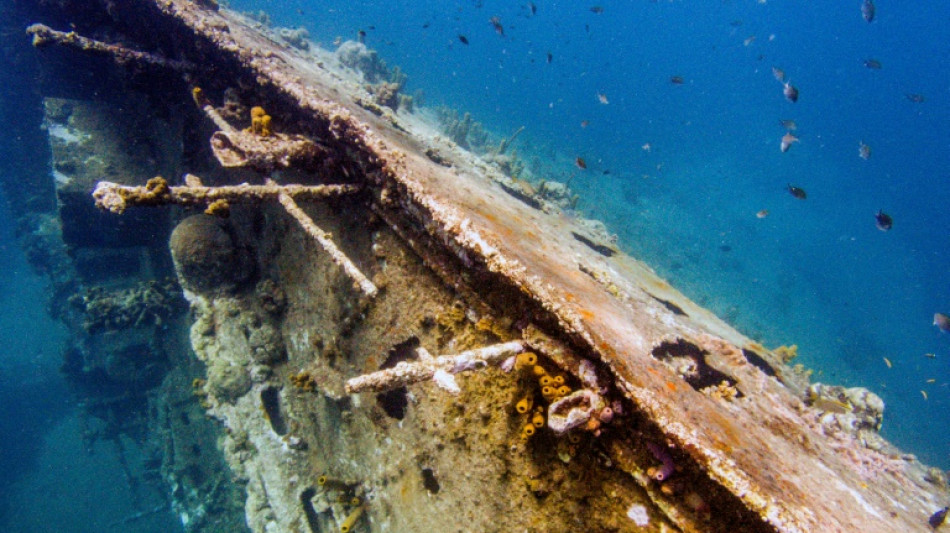
-
 Zuckerberg denies Meta bought rivals to conquer them
Zuckerberg denies Meta bought rivals to conquer them
-
Starc stars as Delhi beat Rajasthan in Super Over

-
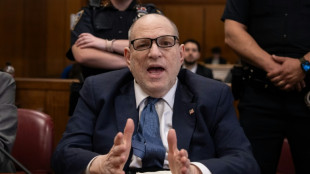 Weinstein asks to sleep in hospital, citing prison 'mistreatment'
Weinstein asks to sleep in hospital, citing prison 'mistreatment'
-
Amorim asks McIlroy to bring Masters magic to Man Utd

-
 Ruud keeps Barcelona Open defence on course
Ruud keeps Barcelona Open defence on course
-
Trump tariffs could put US Fed in a bind, Powell warns

-
 CONCACAF chief rejects 64-team World Cup plan for 2030
CONCACAF chief rejects 64-team World Cup plan for 2030
-
Putin praises Musk, compares him to Soviet space hero

-
 Son to miss Spurs' Europa League trip to Frankfurt
Son to miss Spurs' Europa League trip to Frankfurt
-
US senator in El Salvador seeking release of wrongly deported migrant

-
 Trump tariffs could put the US Fed in a bind, Powell warns
Trump tariffs could put the US Fed in a bind, Powell warns
-
US judge says 'probable cause' to hold Trump admin in contempt

-
 India opposition slams graft charges against Gandhis
India opposition slams graft charges against Gandhis
-
Nate Bargatze to host Emmys: organizers

-
 US Fed Chair warns of 'tension' between employment, inflation goals
US Fed Chair warns of 'tension' between employment, inflation goals
-
Trump touts trade talks, China calls out tariff 'blackmail'

-
 US judge says 'probable cause' to hold govt in contempt over deportations
US judge says 'probable cause' to hold govt in contempt over deportations
-
US eliminates unit countering foreign disinformation

-
 Germany sees 'worrying' record dry spell in early 2025
Germany sees 'worrying' record dry spell in early 2025
-
Israel says 30 percent of Gaza turned into buffer zone

-
 TikTok tests letting users add informative 'Footnotes'
TikTok tests letting users add informative 'Footnotes'
-
Global uncertainty will 'certainly' hit growth: World Bank president

-
 EU lists seven 'safe' countries of origin, tightening asylum rules
EU lists seven 'safe' countries of origin, tightening asylum rules
-
Chelsea fans must 'trust' the process despite blip, says Maresca

-
 Rebel rival government in Sudan 'not the answer': UK
Rebel rival government in Sudan 'not the answer': UK
-
Prague zoo breeds near-extinct Brazilian mergansers

-
 Macron to meet Rubio, Witkoff amid transatlantic tensions
Macron to meet Rubio, Witkoff amid transatlantic tensions
-
WTO chief says 'very concerned' as tariffs cut into global trade

-
 Sports bodies have 'no excuses' on trans rules after court ruling: campaigners
Sports bodies have 'no excuses' on trans rules after court ruling: campaigners
-
Zverev joins Shelton in Munich ATP quarters

-
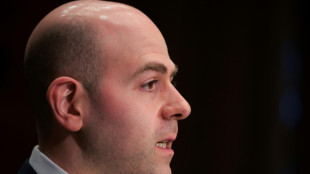 The Trump adviser who wants to rewrite the global financial system
The Trump adviser who wants to rewrite the global financial system
-
US senator travels to El Salvador over wrongly deported migrant

-
 UN watchdog chief says Iran 'not far' from nuclear bomb
UN watchdog chief says Iran 'not far' from nuclear bomb
-
Trump says 'joke' Harvard should be stripped of funds

-
 Macron vows punishment for French prison attackers
Macron vows punishment for French prison attackers
-
Canada central bank holds interest rate steady amid tariffs chaos

-
 Rubio headed to Paris for Ukraine war talks
Rubio headed to Paris for Ukraine war talks
-
Australian PM vows not to bow to Trump on national interest
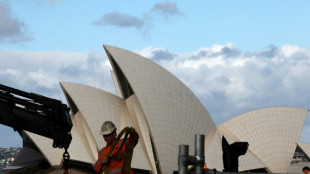
-
 New attacks target France prison guard cars, home
New attacks target France prison guard cars, home
-
Global trade uncertainty could have 'severe negative consequences': WTO chief
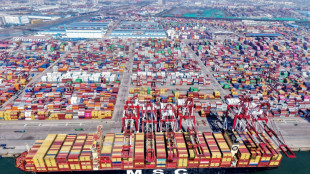
-
 Google facing £5 bn UK lawsuit over ad searches: firms
Google facing £5 bn UK lawsuit over ad searches: firms
-
Onana to return in goal for Man Utd against Lyon: Amorim

-
 Tiktok bans user behind Gisele Pelicot 'starter kit' meme
Tiktok bans user behind Gisele Pelicot 'starter kit' meme
-
'Put it on': Dutch drive for bike helmets
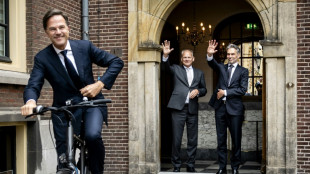
-
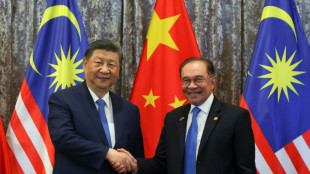 China's Xi meets Malaysian leaders, vows to 'safeguard' Asia allies
China's Xi meets Malaysian leaders, vows to 'safeguard' Asia allies
-
France urges release of jailed Russian journalists who covered Navalny

-
 Gabon striker Boupendza dies after 11th floor fall
Gabon striker Boupendza dies after 11th floor fall
-
UK top court rules definition of 'woman' based on sex at birth
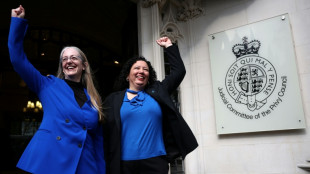
-
 PSG keep Champions League bid alive, despite old ghosts reappearing
PSG keep Champions League bid alive, despite old ghosts reappearing
-
Stocks retreat as US hits Nvidia chip export to China


Protecting undersea cultural heritage in spotlight at mining code talks
The world's oceans harbor a cultural heritage of sunken ships, remains of those lost in the transatlantic slave trade and Indigenous islanders' spiritual ties to the sea that must be protected, NGOs and native peoples say.
They are pushing at a meeting in Jamaica of the International Seabed Authority (ISA) -- an organization established under the UN Convention on the Law of the Sea -- for such protection to be enshrined in a mining code that is being negotiated to govern the exploitation of sea beds in international waters.
"Our ancestors traveled the oceans for thousands of years, passing on information from generation to generation," said Hinano Murphy of the Tetiaroa Society, a Polynesian conservation group.
"We are the children of the people of the ocean," Murphy told AFP, insisting this heritage must be treated as something sacred.
Scientists and defenders of the oceans have long insisted that future industrial-level mining will threaten marine ecosystems.
But "the underwater cultural heritage is a living memory of the generations that came before us. Its protection must be a priority equal to the protection of marine biodiversity," Salim Lahsini, a representative of Morocco speaking on behalf of African countries, said during fierce debate over the mining code.
The draft of the code states that mining companies are supposed to notify the ISA if they come across human remains or archeological objects or sites.
Depending on how the talks conclude, such a find could trigger a suspension of the mining that led to the discovery, but there is no consensus on the details of how this will work.
"To define underwater cultural heritage as shipwrecks is very sad for me," said April Nishimura, a representative of a clan of the Gitxsan Indigenous people in Canada, who explained that her people feel linked to the ocean by the salmon that swim upriver.
- 'Intangible heritage' -
In this spirit, a group of countries led by Micronesia has proposed that underwater heritage be defined to include tangible things such as human remains, shipwrecks and their cargo as well as intangibles such as knowledge of traditional navigation techniques and spiritual practices linked to the sea.
As things stand now, technologies for mining metal deposits in the Pacific are the only ones that seem ready for industrial-scale use.
But the Atlantic could lure profit-seekers next, as it features a different kind of valuable deposits under the sea.
The ocean is the final resting place of shipwrecks, planes shot down during World War II and physical reminders of centuries of trade in slaves from Africa to the Americas.
"Many ships carrying enslaved persons sank during the passage. Many enslaved persons who died during the crossing had their bodies dumped into the ocean," said Lucas Lixinski, a professor of law at the University of New South Wales in Australia.
The slave trade, he said, "is an important story of underwater heritage and our ongoing connections to it."
While halting a mining job if a shipwreck is found seems simple in principle, protecting intangible parts of the undersea heritage is more tricky.
The mining code could protect this kind of treasure by establishing a "checkpoint" before the mining is undertaken, he said.
Indigenous communities and anthropologist would be asked if mining in a given area disturbs these cultural connections "in a way that would be too invasive or destructive," said Lixinski.
The working group led by Micronesia recommends the creation of a specialized committee, to include representatives of Indigenous peoples, to help the ISA decide on a given mining project.
There are already solutions for protecting tangible underwater heritage, said Charlotte Jarvis, a maritime archeologist who represents an NGO called The Ocean Foundation.
"We are trained to spot a shipwreck in seafloor data and we know the best way to collect that data. So getting good data ahead of time will be key," she told AFP.
T.Germann--VB


